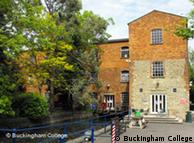With tuition fees set to treble at most British universities from 2012,
suddenly a private degree could be a cheaper option. And with more contact
hours, you could possibly get a better education.
----
Education | 27.04.2011
Rising tuition fees boost private universities in the UK
With the UK government tightening its purse strings to tame a yawning budget deficit, hundreds of thousands of British students are set to begin amassing as much 27,000 pounds (30,000 euros, $44,000) in debt due to higher tuition fees of up to 11,000 pounds. From next year, they are likely to graduate owing three times as much as current students.
Some students are therefore opting to go to a private university, which could now very well be a cheaper option.
It is still an up-and-coming sector in Britain. Unlike in Germany, where almost a quarter of universities are privately run, the UK has just two institutions that don't rely on public funding for their survival.
The two-year degree
The University of Buckingham, which opened in 1976, offers a three-year undergraduate degree in just 24 months, which could work out much less expensive. By reducing the number of holidays to 12 weeks, the institution fits in an extra study term every year.
"Our view is that the long summer, Christmas and Easter holidays are actually disruptive. I think that most students would benefit from our system, where you don't have a summer holiday," Vice Chancellor Terence Kealey told Deutsche Welle.
 Bildunterschrift: Großansicht des Bildes mit der Bildunterschrift: BPP College is one of two private universities in the UK
Bildunterschrift: Großansicht des Bildes mit der Bildunterschrift: BPP College is one of two private universities in the UK
He insists a two-year degree is not a gimmick. "Basically, you're here to work for two years. We think it's a better educational experience."
When students stay at their campus - 100 kilometers (60 miles) north-west of London for just two years - they reduce their living costs by a year. They could also get an extra 12 months' salary from starting work early, making private universities like Buckingham a lot more attractive than they used to be.
The university claims that students don't study any less and the curriculum is not rushed. "We have between eight and nine contact hours a week. Everyone knows that even the best universities in Britain are only giving three to four contact hours a week," Kealey said.
"Practically no university today has one on one, two on one or three on one tutorials. We have a very, very active tutorial program at Buckingham where students are taught in small groups," he explained.
As a private college that is run like a charity, Buckingham misses out on much of the public funding awarded to traditional British universities. However, in a recent university league table published by The Times newspaper, it came 27th out of 115 UK institutions. Its law and business degrees are regularly ranked higher still.
A national University?
Recently, Buckingham was joined by a second private institution, which has now been given permission to grant undergraduate degrees. BPP began as an accountancy training ground in the 1970s but has since moved into law and business programs. BPP, unlike Buckingham, is a profit-making business with a practical approach.
 Bildunterschrift: Großansicht des Bildes mit der Bildunterschrift: Buckingham Mill has been converted into student facilities
Bildunterschrift: Großansicht des Bildes mit der Bildunterschrift: Buckingham Mill has been converted into student facilities
"We are mainly professionals teaching other professionals. So I've been a practicing lawyer and I teach my practicing area," BPP's chief executive Carl Lygo explained.
"Often in the publicly maintained universities, you get research-focused academics who are teaching but who have never practiced. And there is a bit of a disconnect."
With centers all over Britain, BPP is offering law and business degrees for less than 4,000 euros ($5,800) a year. They claim their degrees charge some of the lowest fees of any university in the UK.
No more protection from market forces
Private universities warn that the publicly funded institutions are in for a real shock once the increase in tuition fees begins next year.
"The rest of the sector is going to be exposed to the kind of issues that BPP has always been exposed to. If you are not delivering high enough quality, your customers don't come back," Lygo said, adding that he expects that other private companies will start investing in higher education.
"I suspect that the private sector will move in and offer an alternative that is career-focused and of high quality but is not investing in the leafy campuses, the swimming pools and the sports facilities."
 Bildunterschrift: Großansicht des Bildes mit der Bildunterschrift: Buckingham Church now belongs to the university
Bildunterschrift: Großansicht des Bildes mit der Bildunterschrift: Buckingham Church now belongs to the university
But vice chancellors at many publicly funded universities argue that it is private institutions that will be able to "cherry pick" the most lucrative degrees.
Some say that an increase in private sector education in the US led to a reduction in standards.
The business impact
The real test of private universities' success will surely be with students and employers.
BPP says that major law firms and the big four accountancy companies regularly choose them to train their employees.
Meanwhile, a recent university league table published by The Guardian daily shows that graduates from the University of Buckingham have higher job prospects than students from Oxford and Cambridge.
Similarly Buckingham comes out high in student satisfaction reports.
BPP say there's room for more private sector universities to train young people in programs that can help their careers. "A third of students leaving university in the UK wished they'd studied something that was more career-focused. And that is a shocking indictment of our education system," according to Carl Lygo.
"The UK is below the OECD average in terms of the numbers of graduates that it is producing. So we're clearly not doing as well as other countries in the developed world."
Author: Nik Martin
Editor: Nicole Goebel








